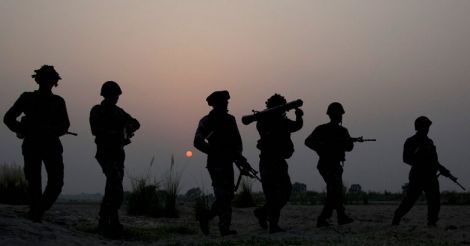Paramilitary forces such as the Central Reserve Police Force, Border Security Force, Indo-Tibetan Border Police, Central Industrial Security Force and Sashastra Seema Bal brave the odds to fight enemies of the nation and to protect our borders. The paramilitary forces come under the union home ministry, while the three armed forces are ruled by the defence ministry.
The union government has initiated steps to grant a handful of benefits at the central and state government level to both serving and retired personnel of the armed forces.
Ex-servicemen status, CSD canteen, welfare board, medical treatment facilities, education benefits, appointment of dependents, reappointment and several other retirement benefits are available to them.
However, the central and state governments are not prepared to grant any of these benefits to the paramilitary personnel who work in more stressful conditions than the defense personnel.
These forces are treated like slaves when they are pressed into defense duties. They are led by IPS cadre officers who are on the last leg of their service. Most often, they have no idea about the nature of work, rules, disciplinary measures and welfare of the forces they lead.
The government is unable to form terms and conditions for the service and pay of around 11 lakh paramilitary personnel and pension benefits of around seven lakh retired personnel or dependents of the deceased ones.
The retired personnel have not been given any kind of benefits. The union home ministry or the heads of the forces could not even start a welfare board for the personnel.
The All India Central Paramilitary Forces Ex Servicemen Welfare Association has submitted numerous memorandums to the government to further the welfare of the paramilitary personnel, retired personnel and their dependents. None of them were taken seriously.
Though the government was forced to grant paramilitary forces the benefits of the central police canteen, a welfare-rehabilitation board, prime minister’s scholarship and ex-servicemen status, it failed to grant the benefits on the scale enjoyed by the defense personnel.
Demands such as the introduction of one-rank-one-pension, special service pension rule (in place of CCS rule), CSD canteen benefits, paramilitary welfare board in each state similar to the military board, appointment of dependents to central and state government jobs and paramilitary service pay for those who are still serving have also been fallen into deaf ears.
The paramilitary personnel had also demand the replacement of the new contributory pension scheme with the old pension scheme enjoyed by the defense personnel.
This treatment has pushed the 11 lakh serving personnel and seven lakh retired personnel to the brink of an outburst.
When the defense forces have their own chiefs, fixed rules and a dedicated ministry, medical treatment facilities and welfare boards at the central, state, district and taluk levels, the government is ignoring the paramilitary personnel who work in more dangerous situations.
Though the government has issued an order to treat paramilitary forces as defense forces considering the nature of their work, they are not given the benefits enjoyed by the defense personnel.
When the central government introduced the contributory pension scheme for those who joined work after January 1, 2004, defense personnel were excluded from it. The government is denying paramilitary personnel their pension by not excluding them from the change to the scheme.
Even after 18 years, there is no law to guarantee jobs to the dependents of the personnel, who die in the line of duty. Serving personnel cannot even retire with pension benefits.
The paramilitary personnel may be forced to take to the streets in violation of rules if the government fails to take action to solve the serious issues faced by them.
The CRPF agitation in 1979 is an example of this. That agitation forced the government to grant ration money, annual rail pass, 60 days of annual leave, terry cotton uniform and promotion beyond the rank of commander to the paramilitary personnel.
(The writer is the national general secretary of the All India Central Paramilitary Forces Ex Servicemen Welfare Association)

























